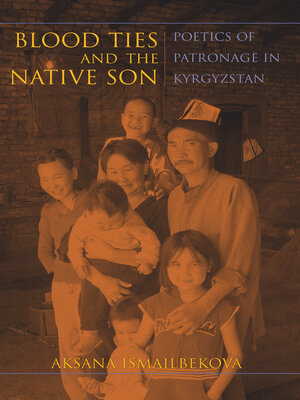Blood Ties and the Native Son
ebook ∣ Poetics of Patronage in Kyrgyzstan · New Anthropologies of Europe
By Aksana Ismailbekova

Sign up to save your library
With an OverDrive account, you can save your favorite libraries for at-a-glance information about availability. Find out more about OverDrive accounts.
Find this title in Libby, the library reading app by OverDrive.



Search for a digital library with this title
Title found at these libraries:
| Library Name | Distance |
|---|---|
| Loading... |
An anthropologist explores the politics and society of Kyrgyzstan through a study of one influential man's life.
A pioneering study of kinship, patronage, and politics in Central Asia, Blood Ties and the Native Son tells the story of the rise and fall of a man called Rahim, an influential and powerful patron in rural northern Kyrgyzstan, and of how his relations with clients and kin shaped the economic and social life of the region. Many observers of politics in post-Soviet Central Asia have assumed that corruption, nepotism, and patron-client relations would forestall democratization. Looking at the intersection of kinship ties with political patronage, Aksana Ismailbekova finds instead that this intertwining has in fact enabled democratization—both kinship and patronage develop apace with democracy, although patronage relations may stymie individual political opinion and action.
"This book is an important contribution to a growing literature on Central Asian politics and society, and by complicating dominant narratives about the dangers of weak state institutions, Ismailbekova has much to offer to the broader research project on democratization and clientelism." —Europe-Asia Studies
A pioneering study of kinship, patronage, and politics in Central Asia, Blood Ties and the Native Son tells the story of the rise and fall of a man called Rahim, an influential and powerful patron in rural northern Kyrgyzstan, and of how his relations with clients and kin shaped the economic and social life of the region. Many observers of politics in post-Soviet Central Asia have assumed that corruption, nepotism, and patron-client relations would forestall democratization. Looking at the intersection of kinship ties with political patronage, Aksana Ismailbekova finds instead that this intertwining has in fact enabled democratization—both kinship and patronage develop apace with democracy, although patronage relations may stymie individual political opinion and action.
"This book is an important contribution to a growing literature on Central Asian politics and society, and by complicating dominant narratives about the dangers of weak state institutions, Ismailbekova has much to offer to the broader research project on democratization and clientelism." —Europe-Asia Studies







